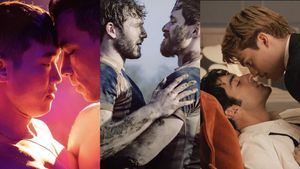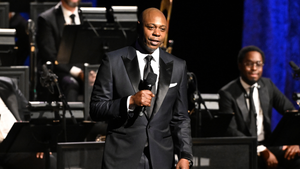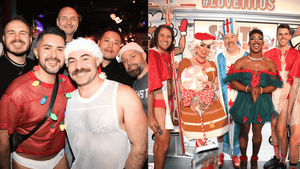FORT PIERCE, Fla. -- The city of Fort Pierce sets in a nebulous zone between heavily developed South Florida and the state's deeply rural inland. Between the socially progressive and sexually liberated shores of South Beach farther south and the conservative fundamentalist regions of the Sunshine State. Driving to the region from a metropolis such as Orlando, roads cut through grassy, largely undeveloped swaths of the state that may leave you wondering if civilization has been left behind. Then almost at once, a resort town overlooking the Atlantic Ocean comes in to view, a fitting introduction into the Sunrise City.
The community this week has been in headlines for the worst reasons. Omar Mateen, a 29-year-old man who lived in the city for years, left Fort Pierce for Orlando before bringing an assault weapon into the Pulse nightclub on Sunday and launching the deadliest mass shooting in U.S. history. Mateen was killed by police in the attacks, and his life story has unfolded in a similar nebulous zone. Hours after the shooting, law enforcement officials revealed he had pledged allegiance to ISIS during a 911 call before the shooting. In the last few days, questions about Mateen's sexuality have risen that are at odds with that extremist religious agenda, with reports he frequented Pulse and that he may have kept a profile on gay dating app Grindr.
Today, the community stresses its ability to pull together. "We stand together during this difficult time to protect our community and serve our citizens," reads a statement on the city website. "The City of Fort Pierce embraces the diversity of our own community and we will not let this senseless act of hate and violence define us. We must all join together as we heal from this tragedy."
LGBT people living in and around Fort Pierce offer varying assessments of the level of tolerance in this community. Joe Nunes, a regular at the Port St. Lucie gay bar TattleTails, came to South Florida and was immediately impressed with the level of acceptance in places like Wilton Manors. He met his future husband here in 2010 and came out to his family days later. He lived for about four years in the Fort Lauderdale area before moving north to the Fort Pierce-Port St. Lucie area about a year ago. The Pulse shooting has weighed heavily on him for a number of reasons. Most obvious is the tragedy. "It's depressing," he said. "It's a sad day. We can't be ourselves." But he also worries about safety. It has occurred to him that Mateen could have made a short trip to TattleTails on Saturday and killed everyone there and still made it to Pulse to cause havoc in Orlando. "I still haven't grasped what has happened."
Mateen is dead now, but the violence has made some patrons here consider what they would do in a Pulse-like situation. Tom Barmore, who has come to TattleTails since moving here from West Palm Beach a year ago, said he wasn't shocked the shooting occurred. "Florida has got a lot of crazy people," he said. Patrons note that in inland Florida, less than an hour away, nationalist groups still organize. Even before the shooting, Barmore said he was considering buying a gun to defend himself. "I need a gun, but I'm afraid if I had it I would use it," he said. "But this guy grew up in this fucking state. I know there are crazies. I don't want someone like [Mateen] to come here. I'm just hoping and praying if that happens I'm the only one with a gun or we'll all shoot each other."
Will Coleman, a patron of TattleTails for five and a half years, figures the Port St. Lucie club wouldn't be much of a target for someone like Mateen, who obviously craved the media attention that has followed the deadliest mass shooting in U.S. history. This club has a capacity of 299, about the same number as were at Pulse, but media would flock faster to a larger market like Orlando.
Barmore, another TattleTails regular, isn't completely charitable to the level of tolerance in the region. He notes a history of Ku Klux Klan activity in inner Florida, which occasionally makes news even today. "It's why I didn't live in Florida for 40 years," he said. Coleman notes that many pockets of South Florida well inland still bear marks of regressiveness. "It's ultraconservative with a lot of rednecks," he said. But Democrats have outnumbered Republicans here every election cycle since 1960. President Obama in 2012 won this county with 53.42 percent of the vote. In 2010, though, Republican Gov. Rick Scott would win the county with 49.9 percent of the vote here to Democrat Alex Sink's 43.22, and Republican U.S. Sen. Marco Rubio would ride into office with 53.6 percent of the vote here, according to the Saint Lucie County Supervisor of Elections.
A strip club near TattleTails called Body Talk today alludes positively to Donald Trump critiques of federal response on the attack. "Hey Mr Prez/Call It What It Is" reads a billboard in front of the club. In a nearby grocery store, Christopher Arrayo, 20, said he didn't principally view this attack as one on gays or Hispanics. "I view it more as radicalism," he said. But he said the community right now has rallied around the tragedy in Orlando. "I am a Christian," he said, "but just because I am a Christian, I don't condemn the LGBTQ community. I see a lot of people coming together."
This community visually has striking divides. As in much of coastal Florida, resorts occupy the waterfront while lower-income neighborhoods sit not far from shore. Lateen's neighborhood can be found there. Several streets away, groceries and convenience stores serve a racially diverse population of black, Hispanic, Indian, and Arab-Americans. Ramesh Kundu, owner of the Orange Corner Food Market, said he often hears strong remarks on a variety of social political issues made in the store. "I don't talk about religion, politics, or such things because there is need an end to those kinds of conversations," he said. He's in service, so he doesn't get in fights. "I don't interfere. But everyone is equal to me."
Omar Mateen did not go to his local mosque often, but he prayed there Friday afternoon, roughly a day and a half before entering the Orlando gay club and launching the deadliest mass shooting in U.S. history. "He attended and left with minimum interaction," said Wilfredo Ruiz, a Council on American-Islamic Relations spokesman.
Ruiz right now is speaking for the Islamic Center of Fort Pierce, the mosque where Mateen worshipped. This also is the mosque where Moner Mohammas Abusalha, the first American to carry out a suicide bombing in Syria, would sometimes worship before blowing himself up in 2014. The Muslim community of Fort Pierce, a city of roughly 41,000 people, now finds itself once again under media scrutiny.
A personal connection between Abusalha and Mateen prompted the FBI to question Mateen, who law enforcement say was interviewed three separate times since 2013. But Ruiz, Florida spokesman for CAIR, said from the religious institution's perspective, "the commonality was the scarcity of times they would frequent the mosque."
Ruiz, who as a Puerto Rican feels a special connection to the victims killed in Pulse on Latin Night, said the small Fort Pierce mosque has not preached a massage of hate. He said the imam has made public his positions on LGBT people. "He spoke about the condemnation of the act and of having no problems working with and relating to the LGBT community," Ruiz said. Mosque leaders said the faith does not legitimize any call to violence. "Under no circumstance does Islam call for any act of violence against the LGBT or any minority community," Ruiz said.
The small center, during its best attended communal prayer each Friday, hosts fewer than 150 people, Ruiz said. Mateen's attendance was "sporadic," and Abusalha came even less frequently.
Mark Parfet, a military veteran in Port St. Lucie, actually met Mateen three years ago at a Dunkin' Donuts, when Mateen blocked Parfet's motorcycle into the lot when he parked. That led to shouting, but the next day, Mateen saw Parfet at the store again and asked about military tattoos. "He said, 'I love your military, I love veterans. Let me buy you a coffee.' And for about two months after that he'd buy me coffee and lunch when he saw me," Parfet recalled.
Josh Taylor, a gay man in Saint Lucie County, had limited interactions when Mateen worked as a security guard at the Saint Lucie County Courthouse in Fort Pierce. "I didn't think about it until I started seeing reports and networked with friends," he said. Mateen would eventually be removed from that job after making remarks to coworkers that were sympathetic to terrorism; that prompted the first of three times the FBI would bring him in for questioning.
Taylor, incidentally, remains skeptical of suggestions that Mateen was a closeted gay man. While there have been reports of people seeing Mateen on Grindr (three men told The Advocate they saw him online in the Fort Pierce area) Taylor never saw him on any dating apps. And knowing about Mateen's removal from the courthouse job, he believes Mateen simply was radicalized.
On Thursday at the St. Lucie Mets stadium, which they call "Tradition Field," there was a special "unity night." Donating blood got you two free tickets to the game. Sheriff's Explorers accepted donations at the front gates and will send them to the Orlando victims. Fans even came out of the stands to form a "ring of unity" along the outer edge of the baseball diamond, showing a small community that doesn't want to be defined by its worst citizen.



































































Charlie Kirk DID say stoning gay people was the 'perfect law' — and these other heinous quotes